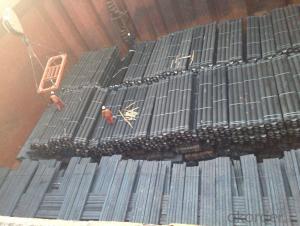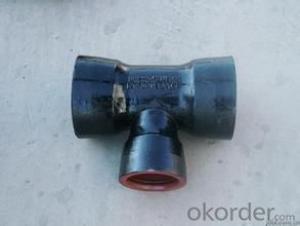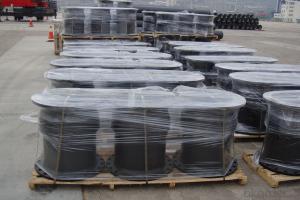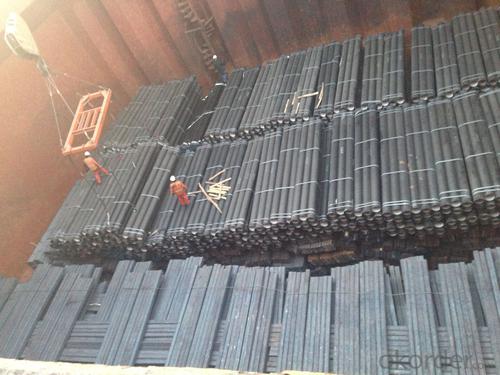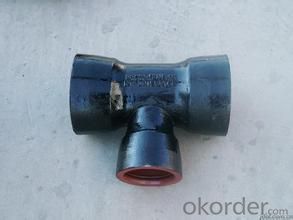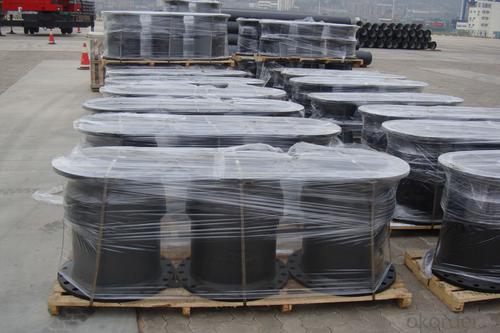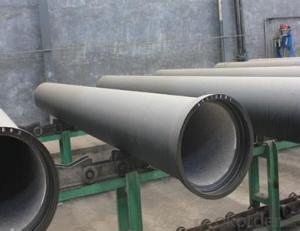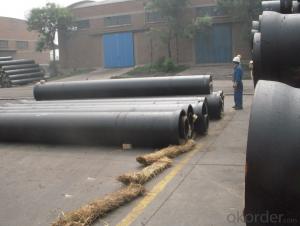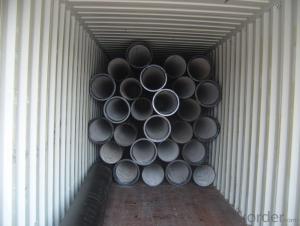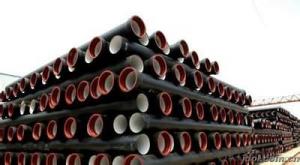DUCTILE IRON PIPES K8 DN100
- Loading Port:
- China Main Port
- Payment Terms:
- TT OR LC
- Min Order Qty:
- -
- Supply Capability:
- -
OKorder Service Pledge
OKorder Financial Service
You Might Also Like
Ductile Iron Cast Pipe is without any defects compare with tradition casting tech, which has many advantages particularly as follow:
(1) High density. In the "vertical upward casting" process, the melt iron of centre liquid column in center crystallizer is continuously feeding for volume shrinkage caused by condensation tube at outer circumference , which lead to be free of shrinkage porosity.
(2) High purity. When melt iron pouring, the mixed impurities such as gas, dross, sand grain which are lighter than melt iron could be eliminated at furnace mouth, its impossible to enter into the crystallizer through the channel, so the melt iron into the crystallizer is very pure.
(3) Strength with toughness. The cooling speed provided by continuous crystallizer is 30 times than sand casting and 5 times than centrifugal casting, and doesn't produce white iron, the eutectic cell volume of continuous cast iron is one eighth to one tenth compare with traditional cast iron. The density of graphite nodule in ductile iron can reach 300-700 pcs/mm2. Therefore, all reason above improve the strength and toughness of continuous cast iron.
(4) Free machining. The high speed cooling make the hardening phase (such as boride, steadite) not appear like reticular, massive or thick, but diffuse like fish bone and pane in shape, moreover, there are tiny graphite flakes inlaid hardening phase. It's free machining in BrinellHardness the range of 250-300HB. However, the Brinell Hardness of 250 is top limit to common metal materials.
(5) Uniform composition of tube wall. The convection mixing of liquid column caused by marching type drawing in crystallizer make the composition of tube wall well-distributed, and concentration gradient very little.
(6) High productivity. To the wall thickness of tube under 10mm, the speed of continuous casting is 1 meter/min, to the wall thickness of tube under 20mm, the speed of continuous casting is 0.5 meter/min, which is high efficiency that centrifugal or other casting tech couldn't reach.
- Q: What are the different types of ductile iron pipe joints?
- There are several different types of ductile iron pipe joints commonly used in various applications. These joints are designed to provide a strong and reliable connection between pipes, ensuring efficient fluid transfer and preventing leaks. Some of the most common types of ductile iron pipe joints include: 1. Push-on Joint: This type of joint is easy to install, as it does not require any special tools or equipment. The spigot end of one pipe is inserted into the bell end of another pipe, creating a tight seal. A rubber gasket is usually used to enhance the joint's resistance to leaks. 2. Mechanical Joint: Mechanical joints are commonly used in water and wastewater applications. They consist of a gland, a rubber gasket, and a follower gland. The pipe ends are pushed into the gland, and the follower gland is tightened, compressing the rubber gasket and creating a secure connection. 3. Restrained Joint: Restrained joints are specifically designed to withstand high internal and external forces such as water pressure or soil loadings. These joints typically use a rubber gasket and a restraining mechanism, such as a bolt or wedge, to prevent the pipe from moving or separating under stress. 4. Flanged Joint: Flanged joints are commonly used in large diameter pipes or applications requiring frequent disassembly. Each pipe end is equipped with a flange, which is then bolted together with the use of gaskets to create a strong connection. Flanged joints provide easy access for maintenance or repairs. 5. Welded Joint: Welded joints involve heating the pipe ends and fusing them together to form a permanent connection. This type of joint is commonly used in high-pressure applications where a reliable and leak-free connection is crucial. Welded joints require skilled labor and specialized equipment. It is important to choose the appropriate type of joint based on the specific application, pipe size, and operating conditions to ensure the integrity and longevity of the ductile iron pipe system. Consulting with a professional engineer or pipe manufacturer can help determine the most suitable joint for a particular project.
- Q: How do ductile iron pipes handle soil movement?
- Ductile iron pipes are renowned for their exceptional strength and durability, rendering them highly adept at managing soil movement. These pipes are engineered to withstand the external loads and pressures arising from soil settlement, ground shifting, or other environmental elements. A significant characteristic of ductile iron pipes lies in their flexibility. Unlike inflexible materials such as cast iron or concrete pipes, ductile iron pipes possess a certain degree of elasticity, enabling them to endure soil movement without succumbing to cracks or fractures. This flexibility empowers the pipes to absorb the stresses imposed by the soil, effectively preventing any substantial harm to the pipeline system. Furthermore, ductile iron pipes exhibit remarkable tensile strength, allowing them to resist the pulling forces that arise from soil movement. The pipes can endure the expansion and contraction of the surrounding soil, thereby diminishing the likelihood of pipe deformation or failure. Additionally, ductile iron pipes are frequently installed using proper bedding and backfilling techniques to further enhance their capacity to handle soil movement. Adequate bedding materials, such as crushed stone or sand, are utilized to deliver stable support to the pipes and distribute the external loads uniformly. This serves to minimize the impact of soil movement on the pipes and uphold their structural integrity. In conclusion, ductile iron pipes are purposefully designed to proficiently manage soil movement by virtue of their flexibility, high tensile strength, and appropriate installation methods. These pipes can effectively endure the stresses generated by soil settlement, ground shifting, or other soil-related factors, ensuring dependable and long-lasting performance in a variety of environmental conditions.
- Q: Can ductile iron pipes be used in areas with high soil settlement?
- Yes, ductile iron pipes can be used in areas with high soil settlement. Ductile iron pipes are known for their strength and durability, which makes them suitable for various soil conditions, including areas with high soil settlement. These pipes have the ability to withstand external loads and ground movement, making them an ideal choice for such areas. Additionally, ductile iron pipes have a high resistance to corrosion, which further enhances their suitability for use in areas with high soil settlement. However, it is important to consider factors such as proper installation techniques, appropriate bedding and backfill materials, and regular maintenance to ensure the longevity and performance of the ductile iron pipes in areas with high soil settlement. Consulting with a qualified engineer or pipe manufacturer can provide more specific guidance based on the site's conditions and requirements.
- Q: How do ductile iron pipes handle ground movement in earthquake-prone areas?
- Ductile iron pipes are designed to withstand ground movement in earthquake-prone areas due to their inherent strength and flexibility. The ductile nature of the iron allows the pipes to deform and absorb the seismic energy without breaking or fracturing. This ensures their durability and ability to maintain water supply and drainage systems even during seismic events. Additionally, ductile iron pipes have superior joint integrity, which further enhances their resistance to ground movement and minimizes the risk of leaks or pipe failure.
- Q: What is the excavation width of ductile iron pipes with diameters greater than 1400?
- Because of differences in depth and soil properties, the excavation width is differentUsually to ensure that the width of bottom surface on both sides of the 600 1400+ manual operation. (such a large pipe flange bolt, the tool is not easy to expand, so the need for manual operation. So wide)
- Q: What's the function of the cement mortar lining of ductile iron pipes?
- You may easily say that this statement is vague and there is no evidence that other manufacturers often do so when promoting other types of lining. However, in order to prove the truth of the above view, we have compiled sufficient examples to demonstrate the reliability of each of these statements from a scientific and logical point of view.We have stated each of these fields and other embedded systems as specious statements. There is only a reasonable conclusion that the cement mortar lining (CML) provides excellent protection for ductile iron pipes and steel tubes.Ductile iron pipe and steel pipe CML CML produces a synergistic effect of the incomparable.
- Q: What is the process of fusion bonding for ductile iron pipes?
- Ductile iron pipes are joined together through the fusion bonding process, which involves applying heat and pressure to create a strong and long-lasting bond. This technique is commonly used in the construction and installation of underground water, sewer, and gas pipelines. To start the fusion bonding process, the surfaces of the pipes are thoroughly cleaned and prepared. This includes removing any dirt, debris, or rust that could hinder proper bonding. Specialized tools and techniques, such as wire brushing or sandblasting, are often utilized to ensure a clean and smooth surface. Once the surfaces are prepared, the pipes are aligned and securely clamped together. A fusion bonding machine, also known as a fusion welder, is then employed to apply heat and pressure to the joint. The fusion bonding machine consists of heating elements positioned around the joint and a hydraulic system that applies the necessary pressure. The heating elements, typically powered by electricity or gas, are designed to reach high temperatures capable of melting the ductile iron material. As the heat is applied, the ductile iron surfaces soften and fuse together, creating a strong bond. The pressure from the fusion bonding machine ensures that the molten iron flows evenly and uniformly between the joint surfaces, resulting in a seamless connection. The duration of the fusion bonding process varies depending on the size and thickness of the pipes and the specific project requirements. Once the fusion bonding is complete, the joint is allowed to cool and solidify, forming a permanent and leak-proof connection. Fusion bonding offers numerous advantages for ductile iron pipes. It provides a reliable and durable joint that can withstand high pressure, temperature variations, and external loads. The seamless connection also minimizes the risk of leaks, which is particularly important for underground pipelines that transport water, sewage, or gas. Overall, fusion bonding is a widely utilized technique for joining ductile iron pipes, ensuring their structural integrity and longevity in various infrastructure projects.
- Q: Can ductile iron pipe be used for water well applications?
- Yes, ductile iron pipe can be used for water well applications. Ductile iron pipe is known for its strength and durability, making it suitable for various applications including water well systems. It has excellent corrosion resistance, which is crucial for water well applications where the pipe is constantly exposed to water and potential contaminants. Additionally, ductile iron pipe has the ability to withstand high pressure and external loads, making it a reliable choice for water well systems that require a strong and long-lasting pipe material.
- Q: How do ductile iron pipes perform in freeze-thaw cycles?
- Ductile iron pipes perform well in freeze-thaw cycles due to their high tensile strength and flexibility. Unlike brittle materials, ductile iron can withstand the expansion and contraction caused by freezing and thawing without cracking or breaking. This makes them a reliable choice for water and sewer systems in regions with harsh winter climates.
- Q: How do ductile iron pipes compare to PVC pipes?
- Plumbing and water distribution systems commonly utilize ductile iron pipes and PVC pipes. When comparing these materials, various factors should be taken into account. Strength and Durability: Ductile iron pipes are renowned for their exceptional strength and durability. They can withstand high pressure and heavy loads, making them suitable for underground and high-traffic areas. Conversely, PVC pipes are less sturdy and more prone to cracking under extreme conditions. However, PVC pipes have the advantage of being corrosion-resistant and do not rust, which is beneficial in certain environments. Installation and Maintenance: Ductile iron pipes are heavier and require specialized equipment and skilled labor for proper installation. In contrast, PVC pipes are lightweight and easy to handle, making installation simpler and quicker. Additionally, PVC pipes require less maintenance as they do not corrode or develop mineral deposits over time, unlike ductile iron pipes which may need regular cleaning and maintenance to prevent rust and sediment buildup. Cost: PVC pipes generally have a lower cost compared to ductile iron pipes. The lower material and installation expenses associated with PVC pipes make them a popular choice for budget-friendly residential and commercial plumbing projects. Ductile iron pipes, while offering superior strength and durability, tend to be more expensive due to the higher cost of materials, specialized installation requirements, and additional maintenance expenses. Environmental Impact: PVC pipes are made from non-renewable resources and can have a negative environmental impact during production and disposal. On the other hand, ductile iron pipes are made from recycled iron and have a longer lifespan, reducing the need for replacement and minimizing waste. However, it is important to note that PVC pipes can be recycled, and many manufacturers have implemented sustainable practices to minimize their environmental footprint. In conclusion, ductile iron pipes and PVC pipes possess distinct characteristics that make them suitable for different applications. Ductile iron pipes excel in strength and durability, making them ideal for heavy-duty applications, while PVC pipes offer cost-effectiveness, easy installation, and corrosion resistance. Ultimately, the choice between the two materials depends on the specific requirements, budget, and environmental considerations of the project.
Send your message to us
DUCTILE IRON PIPES K8 DN100
- Loading Port:
- China Main Port
- Payment Terms:
- TT OR LC
- Min Order Qty:
- -
- Supply Capability:
- -
OKorder Service Pledge
OKorder Financial Service
Similar products
Hot products
Hot Searches
Related keywords
